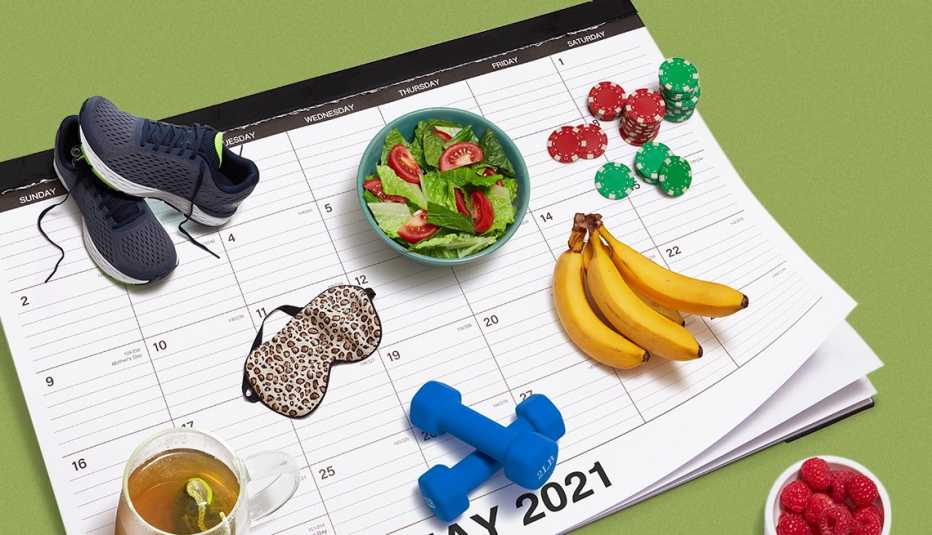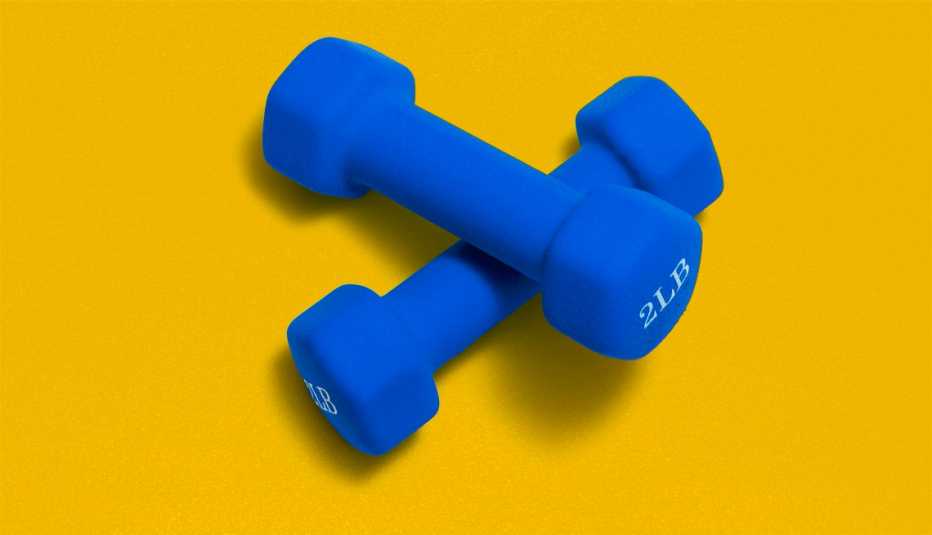Staying Fit


Automated behaviors — making the coffee, reading the news, playing a game on a phone, checking email — account for nearly half of the average person's daily activities, according to research by Wendy Wood, a psychology professor at the University of Southern California and author of Good Habits, Bad Habits. “We do the same thing in the same context almost every day,” she says. “And we do it without thinking about it.” Intentionally or not, you've spent the past year or so creating new, often unhealthy habits.


But as we strive to get back to normal, we're presented with an unusual opportunity to reset our patterns. Here are 60 ideas from health experts. Just remember: Your brain requires up to three months of daily repetition to develop the neural pathway that automates a behavior. “But the biggest gain comes during that first month,” Wood says. “So it's important to stick with it initially.” Be persistent: The habits you set now may be the habits you stick with for life.


AARP Membership— $12 for your first year when you sign up for Automatic Renewal
Get instant access to members-only products and hundreds of discounts, a free second membership, and a subscription to AARP the Magazine.
Boost Your Brain Health
1. Make weekly exercise dates. You can easily talk yourself out of a workout, but it's more difficult to do when you have a standing commitment to work out with a friend. Overall, aim for 150-plus minutes of weekly moderate-intensity aerobic exercise. Exercisers are 45 percent less likely to develop Alzheimer's disease, the Alzheimer's Drug Discovery Foundation reports.
2. Eat a daily salad. Just one serving of leafy greens a day was associated with slower cognitive decline, a 2017 study by Rush University Medical Center showed.
3. Have a superberry dessert. Dark-colored berries like blueberries and blackberries contain compounds that fight inflammation and help protect your brain. One cup of blueberries consumed daily for six months can also lower your risk of cardiovascular disease by 12 to 15 percent, according to 2019 research in the American Journal of Clinical Nutrition. Try berries and plain yogurt as your go-to after-dinner treat.


4. Develop a green tea habit. Especially if your favorite drink is soda. Researchers have found that people who consumed sweetened beverages were more likely to develop Alzheimer's, while some studies suggest green tea might promote cognitive functions.
5. Join a book club. Those who engage their mind most often through intellectual activities such as playing games or reading were 29 percent less likely to develop dementia during a five-year follow-up period, reports a 2018 Hong Kong study of adults 65 and older that was published in JAMA Psychiatry.
6. Once a week, try something new. Listen to new music, learn some words in another language or sign up for a lecture. Lifelong learning is associated with improved brain health, and staying mentally active is linked to delayed onset of cognitive decline.
Go to Sleep Easier
7. Make your bed each morning. According to a survey by the National Sleep Foundation, those who make their bed nearly every day were more likely to report getting a good night's sleep.
8. Change your bedsheets every Sunday. Allergens can disrupt sleep. To cut down on buildup, wash your sheets weekly. Also replace pillows at least every two years and mattresses every 10, both for hygiene and for comfort (they can break down over time).
9. Face your alarm clock toward the wall. And place your cellphone facedown. Artificial light disrupts sleep. Instead of night-lights, keep a flashlight next to your bed to use when needed.
10. Turn the fan on when the lights go off. Or invest in a sound machine. Snoring partners, traffic and other ambient noise can cause you to wake during the night and experience more daytime sleepiness and fatigue. A source of white noise, like a fan, can help modulate that problem.
11. Enjoy some chamomile tea at bedtime. In a randomized, double-blind study from the University of Michigan, those taking a chamomile extract twice a day zonked out 16 minutes faster, on average.
Pump Up Your Heart Health
12. Brush and floss regularly. Swollen or bleeding gums caused by bad oral health may lead to microorganisms traveling into the bloodstream, which could cause inflammation and heart damage. Older adults who skimped on oral hygiene were 20 to 35 percent more likely to die during a 17-year study done by University of Southern California researchers.


13. Try doing 10 minutes of resistance training every morning. That adds up to a truly healthy week of muscle strengthening. In research published in 2017 in the Journal of the American Heart Association, women (average age 62) who did just 20 to 59 minutes of muscle-strengthening exercises each week were 29 percent less likely to die during the 12-year study than those who did none. Low muscle strength is associated with an elevated risk of death in people 50 and older, regardless of general health levels. Even cardio exercise doesn't appear to protect you if you allow your strength levels to deteriorate.
14. Be an avocado sneak. Replace half the butter in your baking recipes with mashed avocado, and sneak this source of healthy monounsaturated fatty acids (MUFAs) into smoothies and spreads whenever you can. Replacing saturated fats with MUFAs can help lower LDL (bad) cholesterol.
15. Walk off your cravings. Smoking puts you at a higher risk for heart disease and stroke. When a craving hits, try lacing up your shoes and heading out for a quick walk and breath of fresh air. Who knows? You might just want to keep going!


16. Put a banana on it. A diet rich in potassium can help offset some of sodium's harmful effects on blood pressure. Add bananas to everything from breakfast cereal to nighttime desserts to PB&J sandwiches. While you're at it, squeeze in more sweet potatoes, tomatoes and oranges.
Shake Off Stress
17. Organize one thing each day—your handbag, a bedside table, a drawer. You'll feel one chore is behind you, which is helpful in feeling less pressured in general.
18. Take a daily “do not disturb” break. Whether at your desk, in your kitchen or on a deck outside, close your eyes and do not open them for anyone. Even five minutes will feel wonderful!
19. Have a go-to ritual that you look forward to when the anxiety is too much. Do something simple like calling a friend, having a cup of tea, playing a song on the piano or sneaking away to read a few pages of a novel.
20. Enjoy a daily “play snack.” Remember what you used to enjoy doing as a kid, and go do that. Play with a yo-yo or Rubik's Cube. Go outside and skip rope or swing a golf club. Doodle, build a tower with toy building blocks, fold origami, draw with colored markers. Inject fun in five- to 10-minute chunks during your day as a way to let your brain relax.
Clean Up Your Diet
21. Bribe yourself into eating vegetables. Find a salad dressing or dip you love; you'll be more inclined to eat veggies dipped in it.
22. Store fruit at front of the fridge. When you bring fruit home, immediately wash and put in a bowl at the front of the top shelf rather than in a drawer. The minute you open the fridge, it will prompt you to eat some.
23. Portion out nuts. In a study that appeared in BMC Medicine in 2013 of adults ages 55 to 80 at high cardiovascular risk, those who ate more than three servings of nuts per week were 39 percent less likely to die of any cause over the next five years of the study. The problem is that people often overindulge and eat them straight out of a large bag or can. Prepack them into individual serving sizes in zip-close bags so you have just one serving, not five.
24. Decorate healthfully. If chocolates are on the table, you'll eat them. Hide the less-healthy snacks and put fruit and nuts on the table within reach.
25. Snack before you shop. Going to the grocery store on an empty stomach — even if it's a digital store — can lead to unhealthy impulse buys. Have a bite to eat, and while you're eating, write out a shopping list and stick to it.
26 Drink your fiber. Throw some fruit into the blender right before it goes bad. Try blending a banana, an orange and spinach; throw in some walnuts for even more fiber and omega-3 fatty acids.



































































More on Health
6 Ways to Calm Your Anxiety
These methods will help you relax when you're feeling stressed
Are You Ready to Reboot Healthy Habits?
The pandemic may have taken its toll. Let AARP guide your resetTeletherapy During the Pandemic
Therapists take calls from anxious older clients as Medicare coverage expands